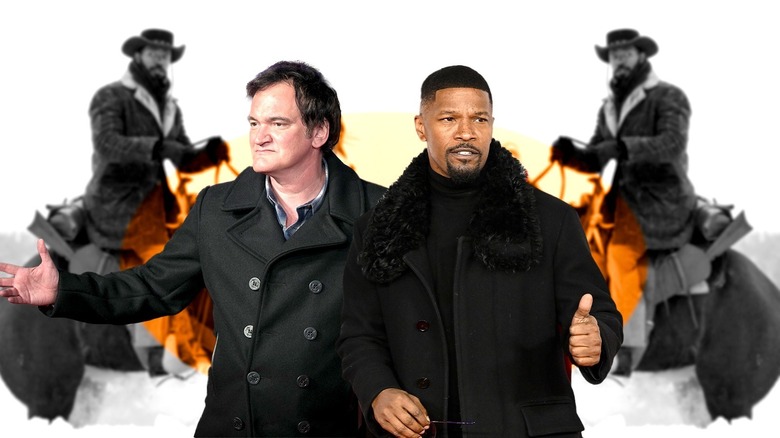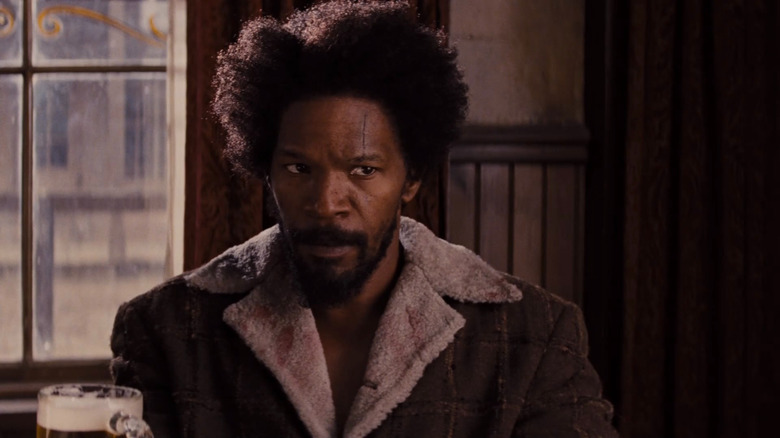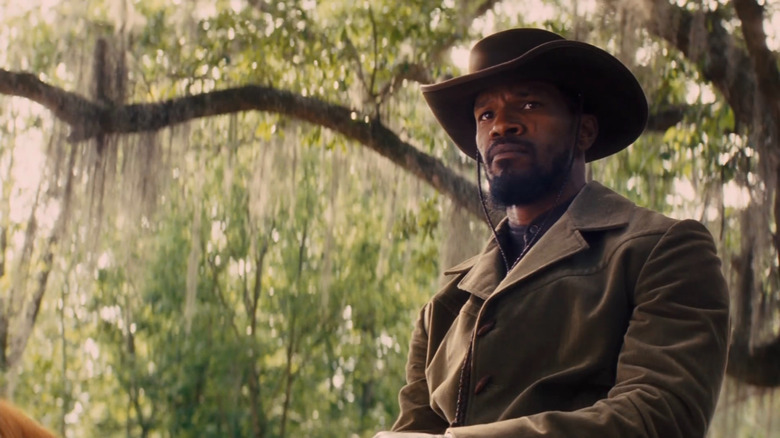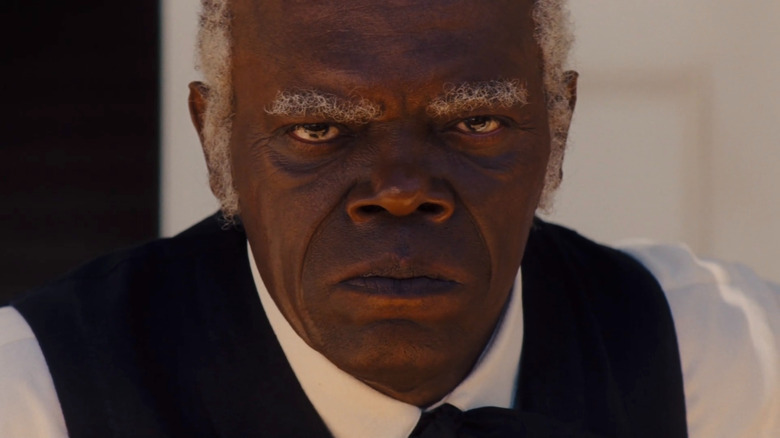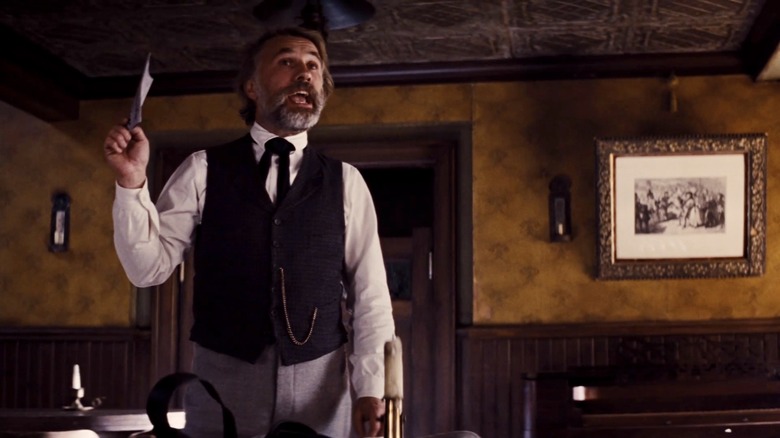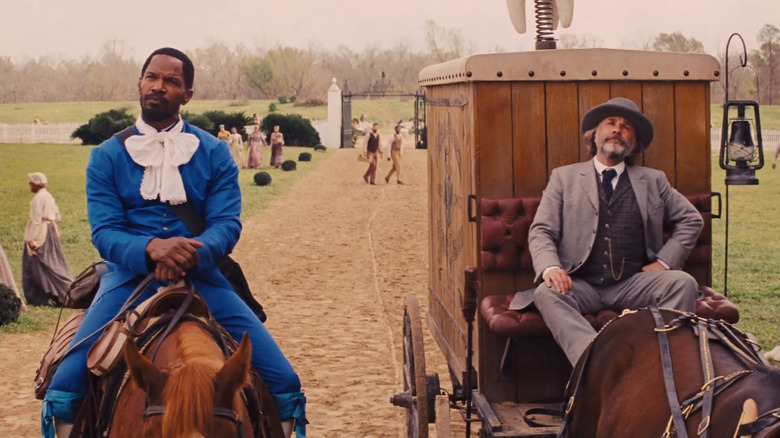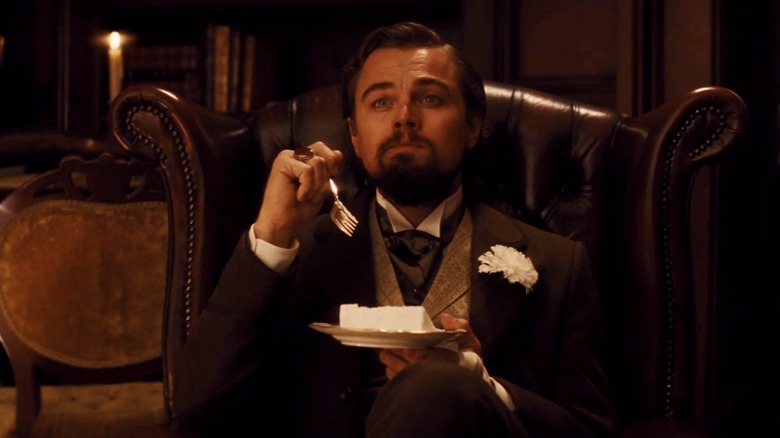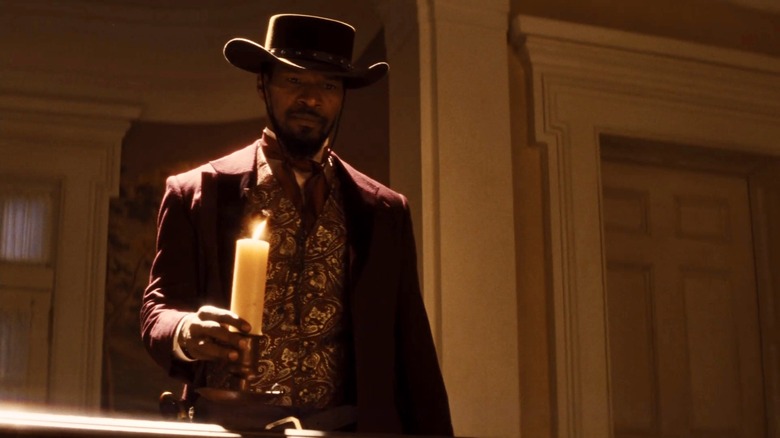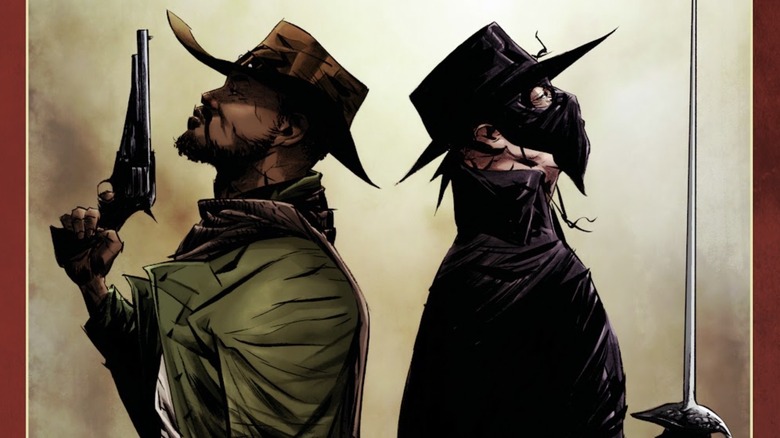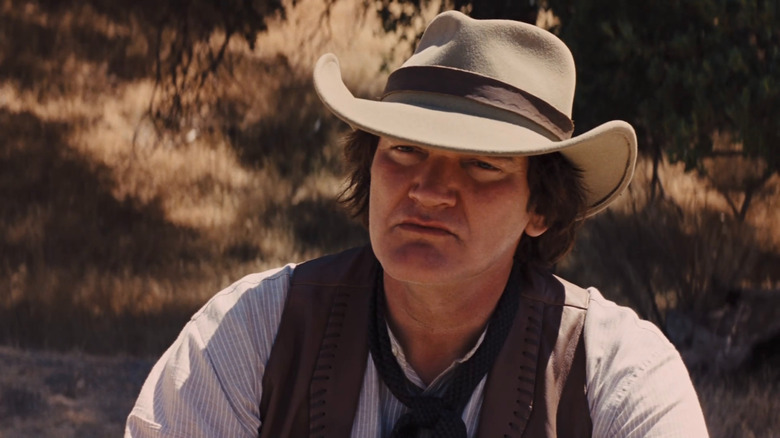Jamie Foxx Doesn't Agree With The Backlash Against Quentin Tarantino And Django Unchained
At a time when sensitivity readers are bowdlerizing old Roald Dahl books to remove any potentially offensive language, you have to wonder what kind of attitude future generations of viewers will take to "Django Unchained." Will some unsanctioned censor try to remove all 110 usages of the N-word from the film? Or will they look back and see a movie that subverts the white savior trope?
Writer-director Quentin Tarantino won his second Academy Award for Best Original Screenplay for "Django Unchained," which remains his highest-grossing movie. Audiences, at least, weren't offended enough to stay away from the theater and keep "Django" from becoming a commercial success. Yet the 2012 film also reignited controversy from early in Tarantino's career, since before he even won his first Oscar for "Pulp Fiction." This went beyond the usual hand-wringing about his fetishization of violence, which continues in "Django Unchained" as the filmmaker stages beautifully if not pretentiously lit bloodbaths with cinematographer Robert Richardson.
One person uncowed by the backlash against the repeated use of the N-word in Tarantino's script was the actor who played Django himself, Jamie Foxx. Speaking to Indiewire in 2018, Foxx suggested that the language in "Django Unchained" was historically accurate, appropriate to a film where a freed slave grows empowered as a bounty hunter and storms Southern plantations, gunning down anyone who would stand between him and his wife, Broomhilda (Kerry Washington).
"I understood the text," Foxx said. "The N-word was said 100 times, but I understood the text — that's the way it was back in that time."
This puts the onus on the viewer to form their own understanding of the text of "Django Unchained." It's something that can be done intuitively, or with the benefit of added insight from Foxx and other sources.
Foxx says people 'knee-jerked towards the N-word'
From the very beginning, Jamie Foxx was forced to be something of an apologist for "Django Unchained" as he promoted the film and defended it against critics who took issue with its characters using racist invective. Foxx won an Oscar for his role in "Ray" as pianist and singer-songwriter Ray Charles; a 2013 interview with The Guardian explored his background growing up in Texas, where he played piano for a house owner who said he didn't want "two n****** in [the] house at the same time."
In the interview, Foxx compared Quentin Tarantino to white artists who thrived by adopting Black musical traditions, saying: "You can't tell me that Eminem ain't hot 'cos he's white or that Elvis Presley isn't a bad motherf*****, or that Quentin Tarantino can't do whatever he likes, 'cos damn straight he can." Referencing Samuel L. Jackson and Leonardo DiCaprio's villains, Stephen and Calvin Candie, Foxx said of the "Django Unchained" critics:
"They knee-jerked to slavery, they knee-jerked towards the N-word. But I come from the south and that's where the word grew. And I think that gave me an upper hand on the material. I know people like Stephen. I know people like Calvin Candie. I played cheese-and-wine parties for men who called us n******. But my grandmother worked as a housemaid all her life and she taught me some truths. I learned those lessons and I learned them in the south."
Foxx also indicated that his grandmother would have been fine with the language in "Django Unchained," saying: "My grandmother used to cuss like a sailor. 'N***** you don't bring your little ass in here, I'm gonna whup it real good.' 'Django' wouldn't bother her at all."
The controversy leading up to Django Unchained
Thirteen years before "Django Unchained," Jamie Foxx had a breakout role as "Steamin" Willie Beamen," the MET-Rx-hawking quarterback in Oliver Stone's 1999 football film "Any Given Sunday." One scene sees Foxx trading dialogue with Al Pacino, saying of the institutional forces that have kept Beamen benched: "Maybe it's not racism. Maybe it's placism. A brother has to know his place."
At the risk of Monday morning quarterbacking Willie Beamen, that same quote could also be applied to Django Freeman as he plays second fiddle to gabby white partners both inside and outside "Django Unchained." (More on that later.)
Stone also rewrote and directed Quentin Tarantino's "Natural Born Killers" script, and though he's never seen the finished film from beginning to end, Tarantino was unhappy with the result. He had kinder words for Tony Scott's direction of his "True Romance" script, but one of the most famous scenes in that film sees Dennis Hopper insulting a mob boss (played by fellow New Hollywood legend Christopher Walken) by expounding on all the ways that "Sicilians were spawned by n******."
Tarantino himself appeared onscreen in "Pulp Fiction," slinging lines about "dead n***** storage" at Samuel L. Jackson. In a 2019 interview with Esquire, Jackson admitted, "When we did 'Pulp,' I warned Quentin about the whole 'n***** storage.' I was like, "Don't say 'n***** storage.'"
In the same interview, however, Jackson cited Stephen, the head house slave in "Django Unchained," as one of his favorite film roles. He appears to share the enthusiasm of his costar and onscreen nemesis, Foxx, who elsewhere told Indiewire, "Working with Quentin Tarantino is the best." Jackson has costarred or cameoed in six of Tarantino's films, and he gave a blunt assessment of the "Django Unchained" N-word controversy, saying, "It's some bulls***."
Other Black perspectives on Tarantino
Quentin Tarantino may have had Jamie Foxx and Samuel L. Jackson in his corner for "Django Unchained," but one person who refused to even see the film was Jackson's other frequent movie collaborator, Spike Lee, who said of "Django" (via The Hollywood Reporter): "American slavery was not a Sergio Leone Spaghetti Western." Lee had feuded with Tarantino years prior over his filmic use of the N-word, and in a 1999 interview, he said he was "not the only person that stepped up," but that Tarantino was "beyond" listening. According to Lee, none other than Denzel Washington confronted Tarantino on the set of the Tony Scott-directed submarine thriller, "Crimson Tide:"
"Denzel Washington pulled him to the side. Quentin Tarantino did rewrites with a couple scenes on 'Crimson Tide,' and during the shoot, Denzel stopped and said, 'Hold up, hold up'... stopped everything and pulled Quentin Tarantino to the side. They held a big brouhaha right in the middle of the set, and Quentin Tarantino was trying to squash it [and say] 'Let's go in the back.' Denzel said, 'Naw, f*** that. Let's talk right now.'"
Just prior to the release of "Django Unchained," Washington told GQ that he had "buried the hatchet" with Tarantino years earlier. His own daughter, Katia Washington, even worked as a production assistant on the film. Meanwhile, Foxx was eager to work with Tarantino well before he landed the role of Django. He told Indiewire, "I would see Quentin at clubs and just be like, 'You the baddest motherf***** on the planet. If I ever get the chance, I'm really ready."
Tarantino's first choice for Django was Will Smith, who once said he turned down the part because, "Django wasn't the lead, so it was like, I need to be the lead."
Enter Dr. King
The year of "Django Unchained," Grantland called Will Smith "the world's biggest movie star," and hearing his assessment of the script ("The other character was the lead!") is telling. In the last half hour, Django does become the lead, but it takes over 130 minutes to get there, and along the way, we endure more than one grandstanding speech after another from the loquacious dentist-turned-bounty-hunter, Dr. King Schultz (whose name loudly pegs him as a white, wannabe Martin Luther King, Jr.).
Years before #OscarsSoWhite led the Academy to recruit more diverse members, Christoph Waltz won his second Oscar for playing Schultz, whereas neither Jamie Foxx nor Samuel L. Jackson received a nomination for their work in "Django Unchained." Schultz dominates the film's baggy first half, doing most of the talking as he takes Django under his wing.
As mentioned, Foxx did win for "Ray," and in his comments to Indiewire, he furthermore compared Tarantino to a "jazz musician," saying, "He just plays. And he has incredible discipline. He says, I only shoot with one camera. I'm a director, not a video selector — so everything he shoots is one camera."
When Schultz tells Django the German legend behind Broomhilda's name, the camera frames them in a low-angle and high-angle shot, respectively. It's positioned so that it's looking down on Django and up at Schultz. Django sups up his food and then sits, attention rapt, as the receiver of white wisdom.
Since he needs Django's help to track down the Brittle brothers, Schultz says, "I'm gonna make this slavery malarky work to my benefit." However, he also gives voice to his own white guilt, and once he gets what he needs from Django, he intends to help him and make him a true Freeman, in the spirit of his last name.
Selective history
In "Django Unchained," Quentin Tarantino casts himself as the Australian slaver who gets blown to kingdom come toward the end. Only by posing as a slaver who upholds the system of oppression can Django find tolerance among white men. It's a costume he wears at Dr. King Schultz's encouraging. "Django Unchained" dresses Don Johnson up like Colonel Sanders and puts Django himself in a blue Fauntleroy suit as he enjoys a test-run superhero moment with a bullwhip and gun. Jamie Foxx's character does have some agency as he plays his part, but full autonomy or "unchaining" only comes at the end.
When they ride into the town where Schultz will shoot down the sheriff, Django receives a lesser version of the welcoming committee in the Mel Brooks comedy "Blazing Saddles" (which our own modern reassessment called "both hilarious and troublesome.") People point and call Django the N-word; they're astonished to see a Black man ride a horse. Here, as in "True Romance," Quentin Tarantino uses the word as a punchline.
Foxx's earlier comment, "That's the way it was back in that time," sums up one line of thinking about the racial language in "Django Unchained." However, in his filmography, Quentin Tarantino has developed a selective memory about history, having completely rewritten World War II in "Inglourious Basterds," for instance. He pulled from the same playbook with the Tate-LaBianca murders in "Once Upon a Time in Hollywood," by which time his unpredictability had become predictable.
Tarantino is true to history — when it suits him. As Slate points out, there's also no historical evidence that a blood sport like Mandingo fighting, which pits slaves against each other in "Django Unchained," ever took place. Unsurprisingly given his love for the decade, Tarantino got the word "Mandingo" from a 1970s movie title.
White cake for two
Will Smith said that when he read the "Django Unchained" script, his reaction to Tarantino was, "No, Quentin, please, I need to kill the bad guy!" Though Stephen is the real mastermind of the house, Smith seems to be referring to Calvin Candie, the plantation owner who uses the pseudoscience of phrenology to argue that slaves have a part of their brains that makes them more naturally submissive, less inclined to rise up against their oppressors.
In the 2019 documentary "QT: The First Eight," Jamie Foxx said that Leonardo DiCaprio had a problem using the N-word on the "Django Unchained" set until Foxx and Samuel L. Jackson convinced him otherwise. DiCaprio gives a committed performance as Candie; he didn't even break character when he accidentally bloodied his hand in a take that made it into the film. With Candie's death at Schultz's hands, the two most overbearing white characters cancel each other out. Yet having Django's wife speak German feels like a contrivance to wedge Christoph Waltz into the movie at Foxx's expense. It also sets up the criticism that Schultz's "harebrained scheme" at Candyland is unnecessary, since, as a German, he would have a perfectly good excuse for approaching Candie to buy Broomhilda.
In 2012, Tarantino engaged in a special Huffington Post debate over this aspect of the plot, which just goes to show that not every bit of the immediate backlash against "Django Unchained" was race-related. The movie establishes that Schultz has a traveling circus background, and Tarantino's rationalization for why Schultz would go to all this extra trouble is that he's the kind of showman who doesn't want anyone else to gain the upper hand. Had he just made Candie a straight offer of $12,000, of course, there would also be no movie.
'There's always gonna be a Candyland'
By the end of "Django Unchained," Jamie Foxx's protagonist has finally come into his own as the Western equivalent of a superhero. As he struts downstairs in Calvin Candie's clothes, Django can no longer be mistaken for a mere sidekick to Dr. King Schultz. There's a case to be made that "Django Unchained" delivers on the promise of its title, liberating Django from the chains of oppression and letting him ride off as the hero of his own story.
Even as Django burns down the Candie plantation, however, the dying Stephen raves, "You can't destroy Candyland. We been here. There's always gonna be a Candyland." And indeed, Django's next offscreen adventure (which used Foxx's likeness for some of its art) found the bounty hunter navigating a very familiar scenario, one that immediately reverted to type and stripped him of the autonomy he gained in the movie.
We'll never have to wonder what a Django story without Schultz might look like, because Quentin Tarantino already co-wrote one and had it published. Dynamite Entertainment billed the seven-issue comic book miniseries "Django/Zorro" as "the official sequel to Django Unchained." In 2019, we reported that a film adaptation of "Django/Zorro" was in development, but it never came to fruition.
For the comic, Tarantino teamed with Eisner Award-winning "Grendel" creator Matt Wagner and artist Esteve Polls for a crossover tale that fell back into subordinating Django to another "wealthy white man." At least, that's how the trade paperback describes Diego de la Vega, otherwise known as Zorro. Here, too, Django gets to dress up and play the original superhero, carving Js and silent Ds instead of Zs, but it only happens after Zorro gets shot in the arm, and before that, Django gets overshadowed while history repeats itself.
From Schultz to Zorro
Depending on who you ask, it might be questionable to call Zorro "white," but the character is Spanish, just like Antonio Banderas, who played Zorro in two movies and who co-starred with Quentin Tarantino in "Desperado" and "Four Rooms." In 2020, when Banderas received his first Oscar nomination for "Pain and Glory," The Los Angeles Times noted that the Academy of Motion Picture Arts and Sciences designates him "Hispanic or Latino." Yet the actor himself initially selected "white" as his demographic when he first came to the U.S.
Banderas later revealed that, at a party on Oscar night, Tarantino pitched him a potential "Django/Zorro" movie, which would have seen him play an older Zorro opposite Jamie Foxx. What's clear is that the European Zorro serves to uphold the Eurocentric tradition in the "Django/Zorro" comic. On its inside flap, the trade paperback edition draws an explicit connection between Zorro and Schultz, describing how Django becomes Zorro's bodyguard, "learning much from the older man (as he did from King Schultz)."
As he's likened to a "servant" and willingly masquerades as Zorro's "valet and escort," Django, too, recognizes how little his circumstances have changed in "Django/Zorro." In a caption box on one page, he narrates, "I thought I'd left slavery and all that ugly s*** behind me. I was wrong. Diego de la Vega was only the second white person I'd ever met who didn't give a damn about the color of my skin."
The first, of course, was Schultz, whose spirit lives on in "Django/Zorro." The story begins much the same way as "The Hateful Eight" did, with a stagecoach stopping for a Black man. Inside, Zorro, addressing Django, says, "Black? Well ... I'd have to say that your skin color is more akin to a lovely Belgian chocolate."
A well-intentioned white savior still is one
"Django Unchained" offered Jamie Foxx one of his best roles, and given his lived experience with racism, it's understandable why he would view the movie the way he does. Yet "Django" is also part of a larger cultural conversation about who gets to tell what kind of cinematic stories. Quentin Tarantino obviously has much love for his characters and his own words as a writer, but in the case of the well-intentioned Dr. King Schultz, maybe it's too much love.
A clear pattern emerges when you compare Django's two adventures with some of Tarantino's other Black characters, such as Marsellus Wallace in "Pulp Fiction" and Major Marquis Warren in "The Hateful Eight," both of whom have white men come to their rescue. Tarantino once told TV host Charlie Rose, "I demand the right to write any character in the world that I want to write." But there can also be unconscious psychological drives at play in a writer's work, and sometimes, the failure to listen, the entitlement to speak, is part of the problem.
"Django/Zorro" substitutes the Archduke of Arizona for Calvin Candie, and it has Django cast off all pretense of posing as a mean slaver, doing Zorro's bidding with the words, "Yassuh! Much obliged, suh." Meanwhile, the N-word shows up all of five times. Some might say that's five more times than necessary, but at the very least, it shows that Tarantino was capable of telling a Django story without 110 instances of the word.
"A white gentleman has no need of a black bodyguard," someone tells Django, but that cuts both ways. By the end of "Django Unchained," he's outgrown the need for a white savior, and you could argue that he never really needed one in the first place.
